กระบวนการมีส่วนร่วมในการอนุรักษ์และถ่ายทอดภูมิปัญญาการทำนาแบบดั้งเดิมของชุมชนบ้านหัวริน จังหวัดเชียงใหม่
Main Article Content
Abstract
This research aims to: 1) study the wisdom of traditional rice farming in Ban Hua Rin, Thung Sa Thok subdistrict, San Pa Tong district, Chiang Mai province; 2) study the community process of participation in conserving and transferring the wisdom of traditional rice farming. This research was a qualitative and participatory action research. The 70 key informants were knowledgeable people in the village, community leaders, villagers in Ban Hua Rin community, administrators, teachers, and students of Ban Hua Rin school; and representing stakeholders. The methods used to collect data include in-depth interviews, sub-group meetings, experience sharing sessions, learning center establishment in school, and training sessions to school students for sustainable conservation. The results of this research were as follows.: 1) The traditional rice farming in Ban Hua Rin community was meant to serve family consumption. Seedling was the methods for rice farming and done twice a year:, in-season (Na-Pe) and off-season (Na-Do). Most of the farm workers were relatives and helped in cooperation. Processes and procedures, equipment, and water management systems, demonstrate the wisdom of adaptation to the environment and the underlying beliefs of people reflected through traditions and various rituals. 2) The community participation in conservation and transfer of traditional wisdom of rice farming consists of 3 steps: 1) Participation in planning; 2) Participation in action and 3) Participation in evaluation. The factors that contributed to successful participation were: 1) Community leaders with leadership skills, devotion, and the ability to motivate the community members; and 2) Harmony and the close-knit relationship of the people in community.
Article Details
Area Based Development Research Journal values copyright protection and licensing to safeguard author rights and facilitate the appropriate dissemination of research. Our policies ensure openness, accessibility, and attribution. Authors retain copyright ownership, and articles are published under a Creative Commons Attribution License (CC BY), allowing sharing, adaptation, and proper attribution. Authors have the freedom to publish under the CC BY license, granting broad reuse and distribution permissions. The journal supports posting articles on third-party repositories, adhering to institutional and funding restrictions. Author guidelines detail copyright and licensing requirements, empowering authors with knowledge about their rights and responsibilities. These policies cultivate an environment of collaboration, openness, and responsible sharing, benefiting authors and the research community while honoring intellectual property rights.


